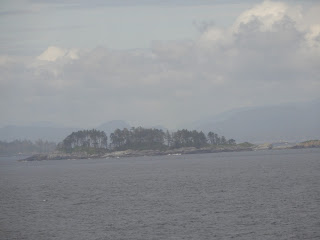Cruising the Inside Passage
Ketchikan was a great town to visit for our last onshore experience. This quirky town had so much to offer that we agreed we would enjoy returning someday to explore it further.
After leaving this fascinating port city, we sailed through Alaska's Inside Passage throughout the night and the next day. Majestic scenery surrounded us, featuring mountains, forests, islands, and rocky outcroppings. As inhabitants of the flat lands of the Great Plains, the views left us in awe. The seas were less gray and murky than they had been a few days earlier near the glaciers, where the silt from the glacial melt had colored the water. Here the water was colored in some spots with a bright blue.
Because of the topography of the area, with so many mountains and islands, road building is almost impossible, so the shores of the Inside Passage are very sparsely populated once past Ketchikan. Occasionally, lonely houses perched on the shore or clung to the cliffs. We also saw small clusters of homes near a lighthouse.
Like much of the rest of Alaska, travel is done primarily by boat or plane. Ferry services provide another option and freighter ships frequent the waters.
Hundreds of islands provide shelter for the waterways from the storms of the Pacific Ocean. Many islands are very small with rocks jutting out from the soil.
The climate of the whole area is wet and mild with a large amount of rain, called "liquid gold" by the residents, recorded each year. We took advantage of an opportunity to attend a Question & Answer session with the ship's British captain, where cruise guests were encouraged to query him about many subjects, including his career path as a captain, places where he had sailed, and technical details about the ship's mechanics. An Australian ER nurse asked him to describe the medical facilities and staffing. He responded that they had two physicians, several nurses, and other technicians on board with most diagnostic tools except for scanning technologies available. He declined to answer questions about the security staffing on board, but assured us we were well protected. Overall, we were impressed with his calm demeanor, professionalism, and his obvious enthusiasm for his chosen profession. We enjoyed the views all day long from the decks and from other viewing areas of the ship, nostalgic about the trip's ending which was upon us. I spent some time in the library drinking in the scenery, reading, and writing in my journal about our wonderful experiences on the cruise.






















Comments
Post a Comment